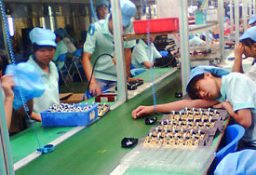Robots are already building cars in the USA and delivering food in Japanese restaurants. Millions of low-skill manufacturing or service jobs are being replaced by robots that need far fewer workers to install, maintain and repair those robots. Driverless trucks and drones will do the same. Shared services like Uber and AirBnb are cutting deeply into traditional service jobs.
Knowledge workers are also vulnerable. Millions of IT jobs have been outsourced from North America to Asia. Social media destroyed the print newspaper industry. Robo-advisors guide clients through the steps of financial planning. During the next decade, high-skill routine jobs in hospitals, universities and law firms will also be automated, thereby eliminating thousands of professional positions. One British futurist predicts that children today will need to work until 100 at 40 different jobs!!!
Final outcomes are difficult to predict but changes are now occurring so quickly that our political and social leaders cannot respond adequately. For example, the cradle-to-grave job security that forms the foundation of our social order is crumbling before our eyes. Massive dislocation and disruption in the world of work is creating a ‘risk’ society throwing millions of individuals into precarious situations in terms of their ability to earn income.
We are moving from jobs that require a basic transaction between humans (think of how many times a day you perform a self-service task—at the gas station, bank, grocery store, cafeteria, online shopping—that once employed millions of workers) to an interactional economy. Think how hard it will be for robots to perform jobs that have a strong ‘emotional’ component, such as teachers, social workers, homecare assistants, palliative care nurses, and so on. These are just a few areas where people currently working in jobs vulnerable to social, economic and technological trends can start identifying future opportunities.
Helping individuals find re-employment quickly in the same field has been the focus of career services for decades, such as helping a laid off journalist become a Media Relations Specialist with a large corporation, a job change that involves “crossing the street” to work for an organization that was covered previously by the journalist as a newspaper reporter.
A career change, by contrast, is more difficult and involves moving from one career path to something completely different; for example, a journalist with a weekend knack for fixing things might need to transition to a full-time career as an independent home renovator. If current trends continue, this shift from job change to frequent career change may require a significant change in learning skills. Career change is a more complex skill to learn than job search…but an increasingly necessary one.
That is why the field of career guidance is turning to narrative approaches for career change, like the one that I’ve been using for almost 25 years. If a person’s previous job experience does not guarantee future employment, then we must look for clues in their life experience to find a better fit and help them make a complete career change involving a change of job title, employer and regular job duties.
My narrative approach to career assessment involves a written analysis of a client’s stories to identify and define very specific elements of a motivational pattern. Each person’s pattern is unique, not dependent on previous skills or work experience; and avoids occupation, education, age, race or gender bias. As the economy changes, the ‘pattern’ is flexible enough to adapt to a variety of career options. How this works and why was the subject of my recently published research paper, which includes reports of positive career changes by this study’s participants:
IT Systems Analyst to Pet Groomer; Electrical Engineer to Public School Teacher; Occupational Therapist in Mental Health to Medical Research Project Coordinator; Desktop Publisher to Certified Financial Planner; Software Tester to Senior Product Marketing Manager; Medical Laboratory Assistant to Library Clerk; Printed Circuit Board Designer to Musical Therapist; Lab Technician to IT Support Analyst; and Senior Telecom Product Manager in a private sector high-tech company to Senior Director, Global Operations in an NGO.
Results of this research show that life-story writing as a career intervention is often accompanied by positive changes, such as more income; more congruence between job duties and values; an increase in positive emotions and a decrease in negative emotions; more clarity and confidence in career decision-making.
Don’t just react to negative trends in the world of work, be pro-active now by mining your life story for gold!

